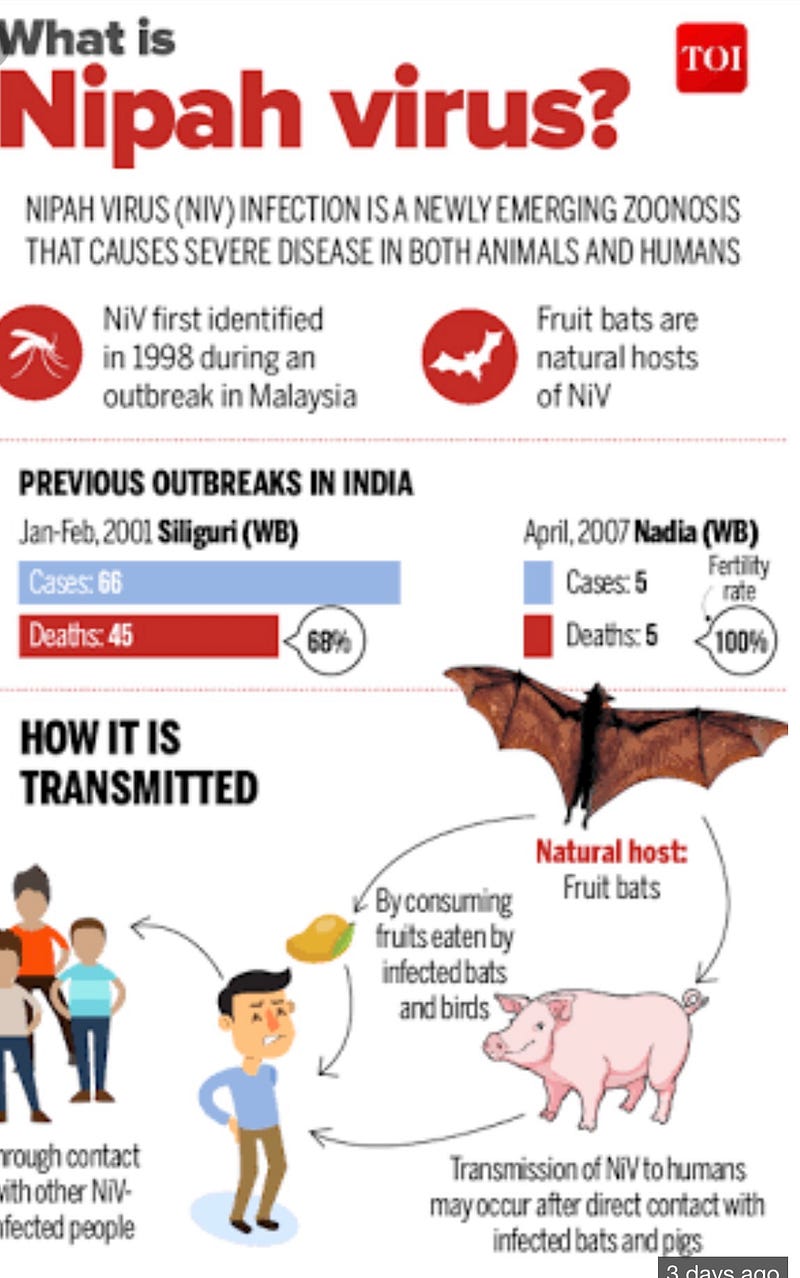BE AWARE OF NIPAH VIRUS
What is the Nipah Virus?
The NiV is an emerging zoonotic pathogen (a virus transmitted to humans from animals) with disturbing abilities.
First detected in Kampung Sungai Nipah, Malaysia, in 1998, pigs were the intermediate hosts. No cases were reported after in Malaysia and Singapore. However, the natural hosts are fruit bats (Pteropodidae family, Pteropus genus).
In 2004, people in Bangladesh contracted the infection after consuming contaminated fruits or products like raw date palm juice by saliva or urine of fruit bats.
WHO has listed this virus in its ‘Blueprint priority’ diseases category.
How does it spread?
The virus spreads directly from human-to-human through close contact with people’s secretions and excretions. Eating partially-eaten fruits by infected bats and partially-cooked meat of infected animals can also trigger the virus. Drinking date palm sap/toddy/juice can also cause the infection.
Influenza viruses annually affect about a billion people worldwide, and cause 250,000 to 500,000 deaths, mainly in the over-65 age group.
Signs and symptoms
This infection can occur in humans without showing any symptoms. However, it is essential for people to look out for influenza-like symptoms. Fever, sore throat, headaches, vomiting and muscle pain (myalgia) are some of the common signs.
The infection progresses to acute respiratory infection (mild to severe) causing interference in breathing. During this phase, people experience atypical pneumonia and acute respiratory distress, which further leads to severe problems.
It further advances to fatal encephalitis, which means causing inflammation of the brain tissue. The symptoms further lead to drowsiness, dizziness, altered consciousness and neurological signs. In severe cases, seizures and encephalitis occur, progressing to a state of coma within 24 to 48 hours.
Throbbing headache & nausea: Facts, symptoms and prevention of Nipah Virus OR Nipah Virus: Facts, symptoms and prevention of the infection with disturbing abilities
Prevention
- Avoid close (unprotected) physical contact with infected people
- Wear NH95-grade and higher masks
- Wash hands regularly with soap
- Avoid consuming partly eaten fruits or unpasteurised fruit juices
- Avoid being around anima pens
- Boil freshly collected date palm juice before consuming
- Thoroughly wash and peel fruits before consuming
- Maintain your and children’s personal hygiene
- Cover your household properly
- Throbbing headache & nausea: Facts, symptoms and prevention of Nipah Virus OR Nipah Virus: Facts, symptoms and prevention of the infection with disturbing abilities
Treatment
- Currently, there is no vaccine or drug available for humans or animals. The primary treatment is intensive supportive care for people suffering from severe respiratory and neurologic complications.
- From contracting the disease to the onset of the symptoms, the incubation period ranges between 4 and 14 days. In some case, an incubation period of 45 days has also been reported.
- People are expected to make full recovery after surviving acute encephalitis. However, survivors have shown long-term neurological conditions like seizure disorder and personality changes. After recovery, a small number of people are seen to have relapsed or developed delayed onset encephalitis.
Dr. Shivani Bhardwaj

Comments
Post a Comment